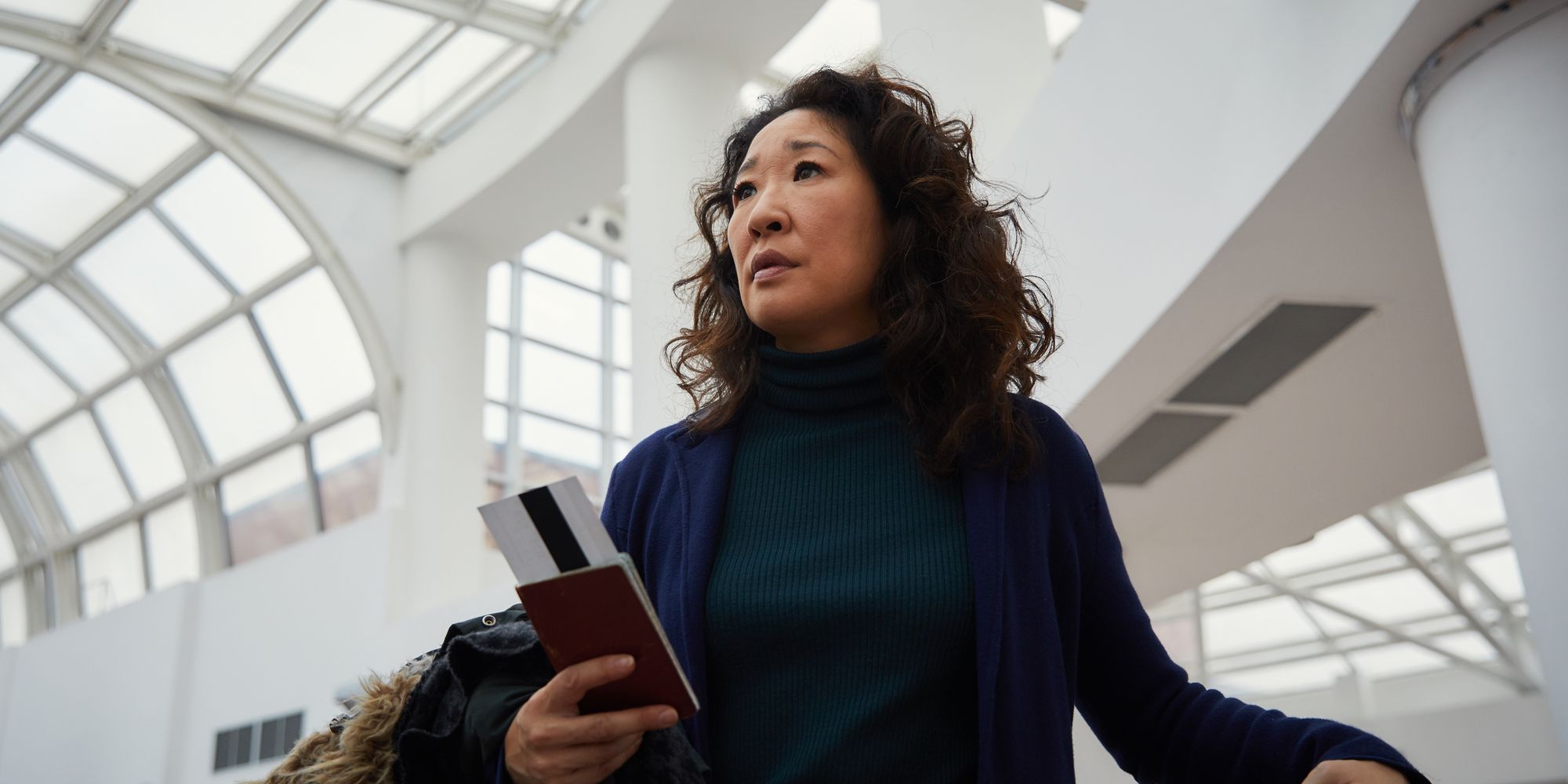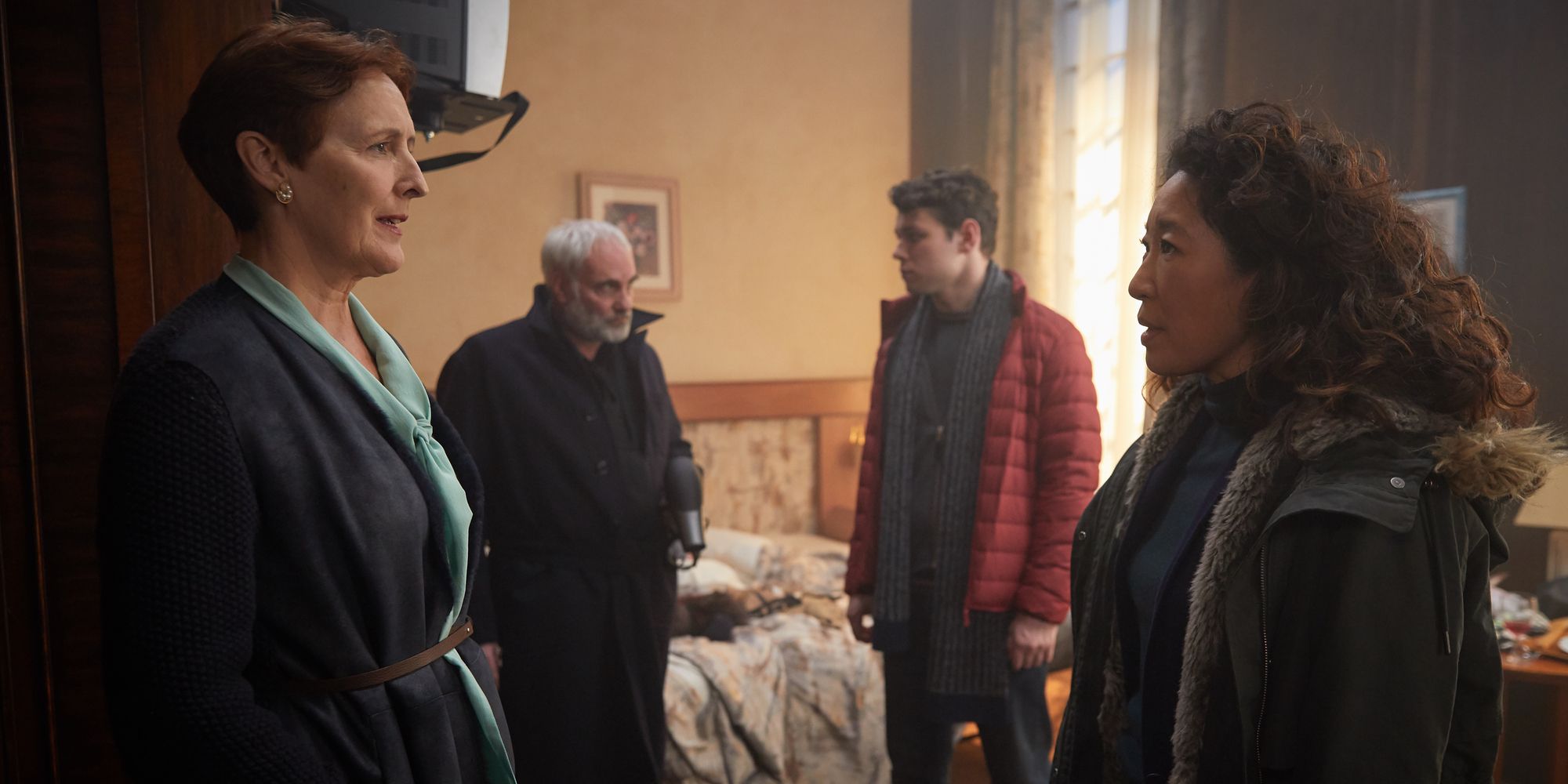Over the course of its first season, Killing Eve became the most unpredictable show on television. For one thing, it outperformed expectations. While most critics fawned over the series ahead of its premiere, audiences, soon fell in line, too. The show saw an unprecedented increase in its ratings from week to week, with the audience steadily growing in ways television hasn’t seen in years. Then there’s the story, showrunner Phoebe Waller-Bridge turned a seemingly conventional spy versus international assassin tale into a thrilling pschyosexual cat and mouse game between two women.
Eve (Sandra Oh) is attracted to Villanelle (Jodie Comer), though she’s not entirely sure why. She’s been attracted to her since before she even met her, back when Oksana was just an unknown assailant whose crimes were loosely tied together in an MI5 dossier. For Eve, it’s an attraction that borders on obsession. It’s also a two-way street. That the story would become largely about this mutual attraction and simultaneous aversion is just one of the ways Killing Eve became such an enjoyable and unpredictable series to watch. As the season drove toward the finale, ‘God, I’m Tired,’ it became clear that, although a recent season 2 renewal would require the narrative downshift from the breakneck speed of the first four or five episodes, it still had a few twists and turns in mind that ran parallel to a more conventional spy drama all while keeping the focus on these two women and the compulsions that have turned their lives completely upside down.
More: The Expanse Officially Moves To Amazon For Season 4
So much of Killing Eve is predicated on characters acting on impulses, being driven to actions they don’t fully comprehend the reasons behind but nonetheless seek to carry out. In the second episode, Waller-Bridge made that idea clear when one of Villanelle’s victims asks her why she’s doing what she’s doing (i.e., killing him). She replies, “I don’t know.” Her response can be read differently. She either doesn’t know (or doesn’t care to know) why she’s tasked with killing this person, his crimes or other people’s grievances against him are of no concern to her. Or, she honestly doesn’t know why she is the way she is. That is, she’s a killer, but why remains kind of a mystery, even to her. In any event, after spending eight episodes with Comer’s outrageously entertaining performance as a Russian killer with an eye for French fashion, the right interpretation may be that it's simply both.
A big part of what makes Killing Eve so watchable (aside from it being a compelling two-hander with a deep bench that includes a great performance from Fiona Shaw as Carolyn and the equally great Kim Bodnia as Villanelle’s handler Konstantin) is the fine line the show walks between unpredictable and unknowable. More striking is how often Waller-Bridge and her writers’ room compel the two to cross, frequently in the same scene. It’s not just for the audience either, though they clearly are the primary benefactors. It also throws the characters for a loop.
Two women with questionable impulse control, and a clear desire to give themselves over completely to those impulses is the show’s beating heart. And, in its own way, and over the course of the first season, Killing Eve has investigated what that tendency means not only for Eve and for Villanelle, but also for the future fo the series. ‘God, I’m Tired’ seeks to sum that feeling up, while also moving the pieces around the board, building season 2 as it goes.
The effort to manage the show’s characters while also expanding the plot is no small task. It’s one even Killing Eve seemed to struggle with in the back half of the season, as everyone gathered conveniently in and around a Moscow prison. While the trip to Russia blew up certain preconceived notions viewers might have had about Carolyn, and especially her relationship with Konstantin and her son, Kenny (Sean Delaney), it also threatened to disrupt a key part of what makes the series so much fun: the uncertain and unpredictable nature of Eve and Villanelle’s relationship. If those two episodes dragged a bit, or spent too much time repositioning the pieces around the board, the finale excels at disrupting expectations of where the series was heading, all while delivering the face-to-face viewers have been waiting for since Villanelle and Eve had a chat over some reheated Shepard’s pie.
Aside from tabling a larger discussion and exploration of who the Twelve are and what they want, perhaps the most unpredictable aspect of the finale is that it leaves questions about Carolyn’s knowledge of the group and her true allegiance unanswered. That’s in part because Waller-Bridge likely wants to leave a clear destination for season 2, but also because Killing Eve is far more interested in (and interesting as a result) examining the question of who these women are. As Konstantin puts it, with a blanket statement that is meant to be read for not only his precocious daughter but also Villanelle, Eve, and even Carolyn. They’re all so annoying, but so amazing.
Like all the women on the show, Eve’s tendency toward annoyance (flicking the glove compartment lever while en route to Anna’s apartment, pushing at cracks in windows until they shatter, etc.) makes her very good at her job. It also alienates Eve from those closest to her, while completely vexing the men around her. That’s a plus; Sandra Oh's Eve is one of the most memorable new characters on television in 2018, eclipsed only by her co-star, her nemesis, and her obsession. As Eve recounts in the season’s climax, a low key confrontation between the series' two protagonists, she’s lost two jobs, a husband, and a best friend (though that last one is on Villanelle) because of this reflexive urge to poke at something until it breaks. The moment immediately follows a champagne-throwing fit that's as much a sign of frustration as it is celebration. It’s no wonder, then, that she’s been compelled to chase Villanelle all season long, but has no idea what to do with her once she's caught her. They’re kindred spirits, disruptors of the status quo whose unpredictability makes them dangerous, especially to one another.
As much as the building of the show’s world over the past few episodes steered it toward a more conventional storytelling path, the finale once again proved how off kilter a drama Killing Eve really is and will hopefully continue to be. There’s a sense that, like Eve, the series doesn’t know what to do with Villanelle once the two are in a room together, and so it gestures toward the extreme by having Eve plunge a knife into Villanelle’s belly in lieu of taking the plunge with her romantically and sexually. What actually occurs is a well-calculated half measure that delivers the unexpected while accommodating the inevitable, necessary delay that signals season 2 is on the way. Such a half measure doesn't make the final moments half-effective, though, it merely illustrates that even shows as fun and inventive and unpredictable as this have to, at some point or another, keep feeding convention in order to keep going.
Next: Picnic At Hanging Rock Review: A Haunting, Dreamlike Limited Series
Killing Eve will return for season 2 on BBC America in 2019.



